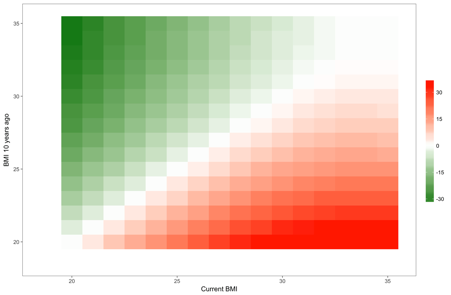Session Information
Date: Tuesday, October 23, 2018
Title: Epidemiology and Public Health Poster III: SLE, SSc, APS, PsA, and Other Rheumatic Diseases
Session Type: ACR Poster Session C
Session Time: 9:00AM-11:00AM
Background/Purpose: Psoriatic Arthritis (PsA) is a progressive and often destructive joint disease that causes pain, swelling and joint stiffness, and can lead to an impaired quality of life. As psoriasis commonly precedes PsA, people with psoriasis provide an important population for studying the effect of modifiable risk factors in the development of PsA.
Methods: Incident cases of psoriasis, diagnosed between 1998 and 2014, were identified from the UK Clinical Practice Research Datalink. The association between baseline psoriasis severity, smoking, alcohol consumption and body mass index (BMI) , after adjustment for potential confounders, and development of PsA was assessed using generalised additive models. In addition, the possible non-linear and cumulative/lagged risks associated with change in BMI during follow-up were investigated using distributed lag non-linear models.
Results: The base population consisted of 90,189 incident cases of psoriasis (42% males, mean age 51), of which 1409 developed PsA after the record of their psoriasis diagnosis. Significant increases in the risk of developing PsA were observed for BMIs of 25.0-29.9 (ORadj 1.79 (CI95 1.46 – 2.19)), 30.0-34.9 (ORadj 2.10 (CI95 1.67 – 2.63)), and ³35.0 (ORadj 2.68 (CI95 2.09 – 3.43)) compared to <25.0. Increased risks of developing PsA were associated with having severe psoriasis: ORadj 3.40 (CI95 2.83 – 4.08) and alcohol consumption: ORadj 1.13 (CI95 0.7275 – 1.7047), ORadj 1.46 (CI95 1.08 – 1.97) and ORadj 0.77 (CI95 0.46 – 1.29) for ex-, current and heavy drinkers respectively, compared to non-drinkers. Associations with smoking were not significant: ORadj 0.95 (CI95 0.78 – 1.15) and ORadj 0.87 (CI95 0.70 – 1.07) for past and current smokers respectively, compared to non-smokers.
A BMI risk calculator was produced to demonstrate the effects of reductions in BMI on (cumulative) risk of developing PsA (Figure 1). For example, reducing BMI over a 10-year period (linearly) was associated with a reduction in the risk of developing PsA when compared to BMI remaining constant over the same period.
Conclusion: The findings from this study add to the growing evidence that severity of psoriasis, alcohol use and increased BMI are associated with an increased risk of PsA in people psoriasis. Using measurements of BMI over time allowed us to quantify the burden of continuing weight gain on the risk of PsA and, for the first time, we have shown that reducing BMI over time results in a reduction in the risk of PsA. As PsA affects around 20% of people with psoriasis, weight reduction amongst those who are obese may have the potential to greatly reduce their risk of PsA in addition to providing additional health benefits.
Figure 1- Risk calculator for BMI and developing PsA, representing the changes in risk associated with a linear change in BMI vs constant BMI over a 10 year period. Positive changes (shown in red) indicate an increase in risk with negative changes(in green) indicating reduced risk.
To cite this abstract in AMA style:
Green A, Shaddick G, Charlton R, Snowball J, Nightingale AL, Smith C, Tillet W, McHugh N. Modifiable Risk Factors and the Development of Psoriatic Arthritis in People with Psoriasis [abstract]. Arthritis Rheumatol. 2018; 70 (suppl 9). https://acrabstracts.org/abstract/modifiable-risk-factors-and-the-development-of-psoriatic-arthritis-in-people-with-psoriasis/. Accessed .« Back to 2018 ACR/ARHP Annual Meeting
ACR Meeting Abstracts - https://acrabstracts.org/abstract/modifiable-risk-factors-and-the-development-of-psoriatic-arthritis-in-people-with-psoriasis/

